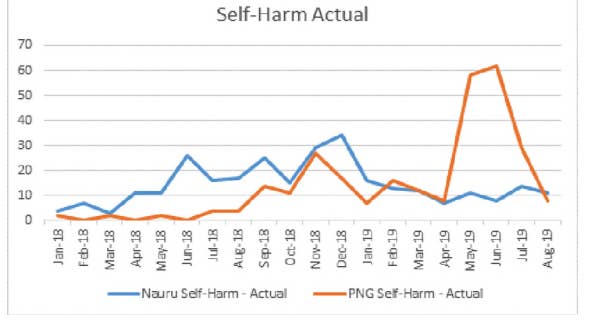
Incidents of self-harm spiked markedly among refugees and asylum seekers held in Papua New Guinea after the Coalition was reelected in May 2019.
According to the government's own data, there were more than 60 incidents of self-harm in Papua New Guinea in June 2019 and just under 60 in May. There were fewer than 10 in April.
Behrouz Boochani, a refugee held on Manus Island, told the ABC that the surprise Coalition victory made the men lose hope.
The spike is shown in a graph created by the Department of Home Affairs, which administers Australia's offshore detention regime. The new data was provided by the department to a parliamentary committee considering whether to repeal Australia's laws around medical evacuations.
The so-called "medevac" law gives doctors greater control over medical transfers from offshore detention in Nauru and Papua New Guinea to Australia. The government wants to repeal the law, with a Senate vote expected after the committee reports back on the repeal proposal later this month.
The home affairs department suggested the law itself had worsened self-harm in its submission to the inquiry — the only one out of almost 100 to argue for medevac's repeal.
The department has argued that "self-harm is perceived as the most expedient means of accessing medical transfer under the provisions".
It said self-harm incidents increased during the parliamentary debate on the medevac law, and "more significantly" since the election on May 18.
The graph shows that although self-harm increased in November 2018, by far the most dramatic spike was from May to June. The medevac law commenced on March 1, 2019. An earlier version of the bill was introduced in December 2018.
Appearing at the August hearing, the former MP who spearheaded the legislation, Kerryn Phelps, said it was not true that medevac had increased self-harm. "The incidents of self-harm related to declining mental health were increasing before medevac and was one of the reasons it was needed. The government's rhetoric and statements about repealing the legislation triggered another level of hopelessness and a new round of self-harm and suicide attempts after the last election," she said.
Asked to substantiate its claim that detainees in Papua New Guinea saw self-harm as the easiest way to get a transfer, the department said that of the 112 people transferred to Australia under the medevac law, nine had been involved in 18 incidents of self-harm in the 11 months leading up to the initial discussions in parliament of the medevac law.
That increased almost six-fold to 121 incidents, involving 50 individuals, between Oct. 1, 2018, and the end of August.
A study of the health of people detained offshore, by doctors leading the medical evacuation applications, found that 97% had a physical ailment and 91% had one or more psychiatric health problems. The study only included those who had sought their assistance.
At the end of June 2019, there were 493 people held in Papua New Guinea and 319 in Nauru.
If you or someone you know needs help, you can call Lifeline Australia on 13 11 14 or Beyond Blue Australia on 1300 22 4636.
